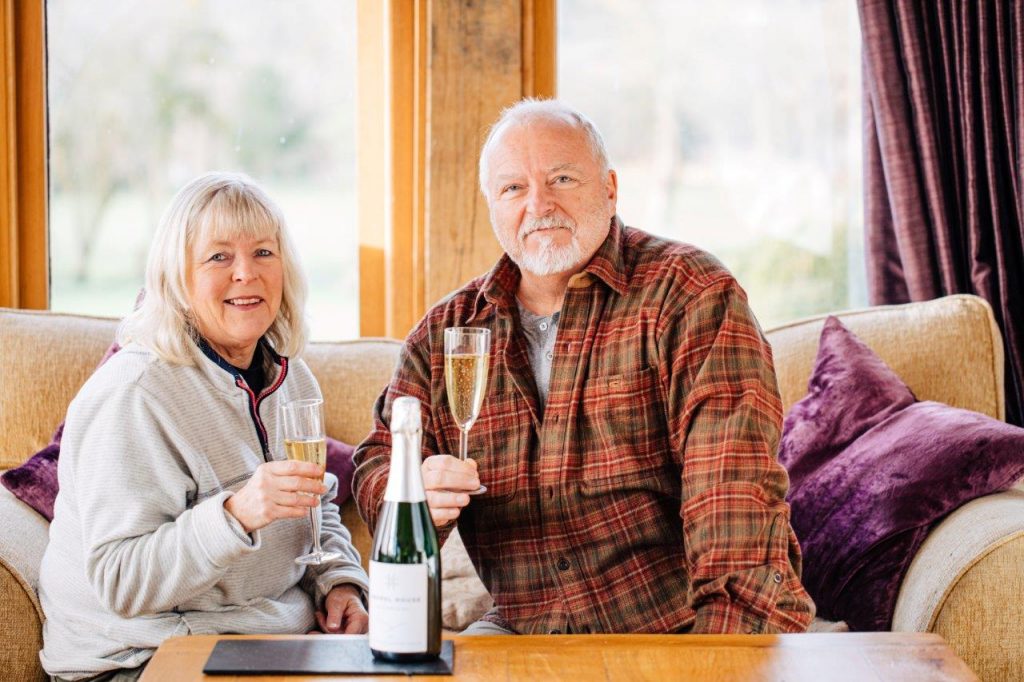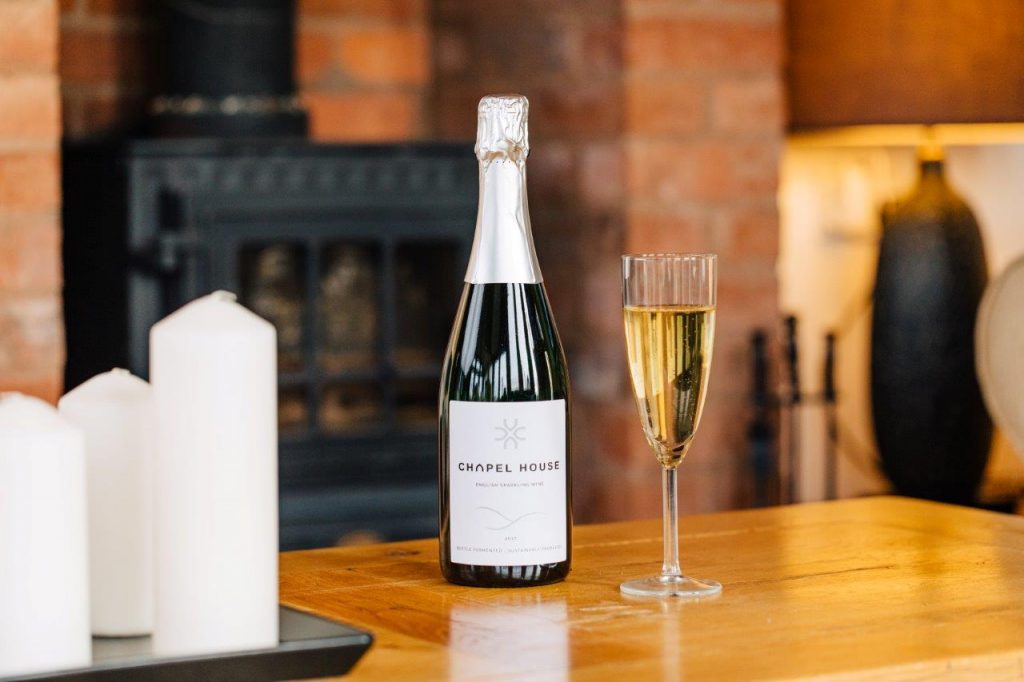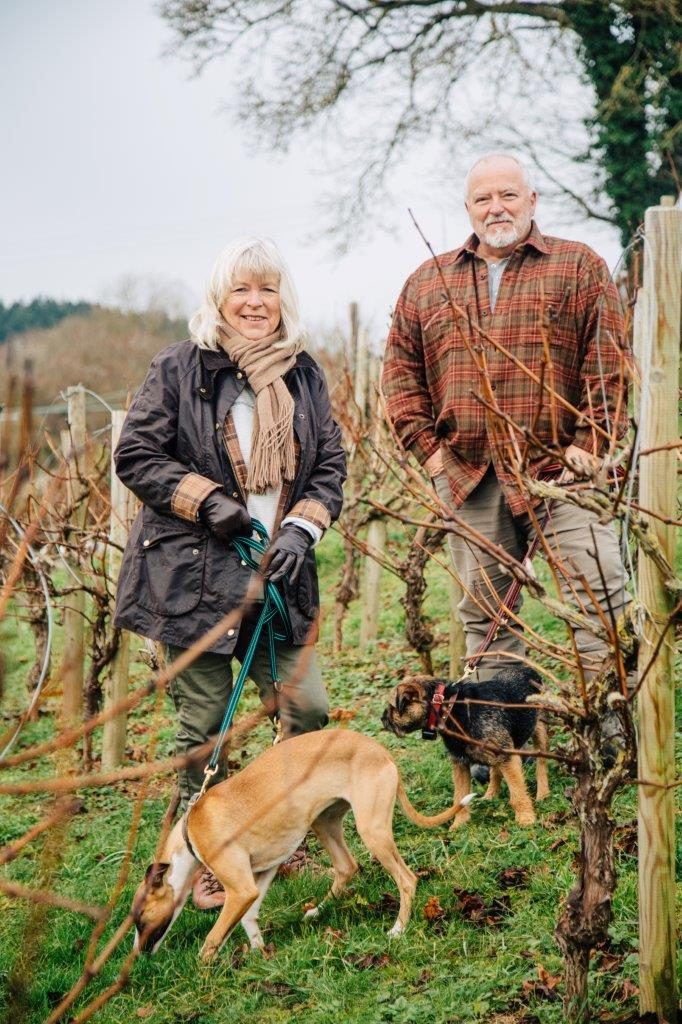Husband-and-wife team, Judith and Tim Davies, have given up their dentistry practice to grow a sustainable wine-making business at their family home in in the hamlet of Broadwas, Worcestershire. Wye Life found out more…

Why did you start Chapel House? What was the initial motivation?
We love wine which became a rather enjoyable hobby around fifteen years ago.
From hobby to vineyard, that’s quite a leap!
Absolutely but people enjoyed the wine we were making, and we’re passionate about it so it seemed the right thing to do. There’s quite an appetite now for good English wine.
I imagine planting and managing a vineyard is quite hard work…
It has been, and still is, but also very satisfying and rewarding. We decided to expand the vineyard as a fully-fledged business venture after producing small amounts of wine for friends and family over the years.
We had a small area of hillside and had attempted to keep pet sheep and goats, but it wasn’t for us. Instead, we decided to have a go at planting vines. We knew it might be arduous as the hillside was so steep and we’d have to cultivate the vines by hand, but we went for it. We planted 400 vines and, we’re very proud to say, many a bottle of Chapel House wine made with our grapes has been enjoyed over dinner since.

Sustainability is incredibly important to you. Please tell us more about your ethos…
There’s clearly a demand for responsibly made tipples now. The public are demanding a more responsible and nurturing approach to how our food, and wine, is produced. Caring for the environment and sustainable farming is clearly the way forward.
How does this translate into production of the wine?
Every one of the 3,000 vines planted at the two-and-a-half acre vineyard nestled in the Teme Valley are not sprayed with harmful chemicals, and each grape is hand-picked by us. No heavy farm machinery is used in the cultivation process. All our electricity used in the growing process is generated by solar panels on the roof of Chapel House.
Once collected, the bunches of Seyval and Phoenix grapes are loaded up and taken to Three Choirs Vineyard, just over the Malvern Hills, and it’s turned into wine.
What about your packaging? Is that eco-friendly?
Instead of glossy packaging, Chapel House wine makes its final journey to be enjoyed by wine lovers in recyclable cardboard cartons, and only to locations within the UK.
Is Chapel House wine suitable for vegans?
The number of vegans in Britain quadrupled between 2014 and 2018. Chapel House wine is, crucially, suitable for vegans, with no egg whites or animal by-products used in the fining process.
How can readers purchase Chapel House wine?
We’re online. Priced at £25.99, Chapel House wine is now on sale at www.chapelhousevineyard.co.uk
We’d love to hear what Wye Life readers think.
You described Chapel House as “your precious environment”. What did you mean by that?
It’s very much a family-run business that put the protection of our “precious environment” first and foremost. With help from our family, including our four children, we have always worked our vines by hand, without using any herbicides or insecticides. We encourage plants and flowers to grow among the vines and respect the insects, both in the ground and on the vines. We are very aware of our precious environment and we do everything we can to protect it.”
You were saying that this isn’t the first time wine has been grown here…
This area enjoys a mild climate similar to the wine-growing regions of France and being sheltered by the Malvern Hills it appears top be the perfect spot. We have deeds and documents dating back to 1604 that show monks from the Worcester Diocese grew vines here, as well as apples for cider. So did the Romans. We’re just carrying on a fine tradition.
You also mentioned your growing style is relatively rare in the UK…
Because our hillside is so steep, our older vines are trained in the ‘goblet vine’ style, as favoured by the Swiss, and we are possibly the only UK vineyard to use this method. Where they differ from vines grown on trellises is that they are arranged on short arms with no wires or other support, the vine resembling a goblet wine glass. Roots can grow to twenty metres deep in search of moisture, making the vines less sensitive to drought. Growing vines this way promotes a slow, even ripening of the grapes, with good air circulation through the canopy.
The grapes in our new vineyard over the other side are gloriously draped across trellises on a south-facing escarpment in the shape of an amphitheatre, which is breath-taking.

How would you describe Chapel House wine?
Chapel House English sparkling wine itself is elegant, dry and crisp with subtle notes of bright green apples, pears and peaches. It goes particularly well with shellfish, light salads, spicy, white meat dishes and mild cheeses, including vegetarian and vegan alternatives.
Who do you hope will enjoy your wine?
We’d like to think it would appeal to couples wanting to take their eco-conscious lifestyles down the aisle and those wanting a special occasion wine without the carbon footprint, a refreshing alternative to Prosecco (made thousands of miles away) and costly Champagne.
Do restaurants stock your wine?
We’re in talks with regional restaurants looking to showcase sustainable wines on menus. Sustainable wines are certainly on diners’ radar now.
What advice would you give anyone wanting to start their business or, perhaps, turning a hobby into one?
When we reached retirement, we absolutely didn’t want to spend our time twiddling our thumbs and decided to turn our wine-making into a full-time venture. We have planted thousands of new vines over the other side of the hill, so people can enjoy what we produce as much as we do. It’s a bit nerve-wracking, but also very exciting. I think that’s the point. Don’t let your dreams pass you by – seize the opportunity when you can.
…
In Spring 2020, Judith, originally from Bradford, and Tim, from south Wales, plan to open a tasting room in the grounds of Chapel House, which is mentioned in the Doomsday Book.
Guests will be able to try Chapel House, look around the vineyard, hear the fascinating story behind the growing and production process, from grape to bottle, and uncover the history of the vineyard.
You can also meet Ghillie and Trefor, the family’s Whippet and Border Terrier.
Photography by Jack Spicer Adams
www.jackspiceradams.com




Leave A Reply